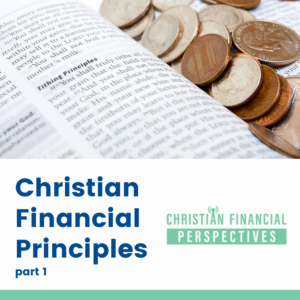Click below to listen to Episode 107 – Christian Financial Principles Part 1
Subscribe: Apple Podcasts | Google Podcasts | Spotify | Amazon Music | Stitcher | RSS | More
Christian Financial Principles Part 1
Tune in to part 1 of our 2 part series on 12 Christian Financial Principles. In this episode, Bob and Shawn cover the first 6 principles out of 12 that we, as Christians, should all strive to live by. These Christian financial principles are full of wisdom since they come directly from scripture. What’s amazing is that these are just as relevant today as they were thousands of years ago. This is what is so great about Biblical scriptures – their ability to transcend time and find relevance even in today’s world.
The first 6 Christian financial principles that we are covering today include:
- God Owns It All
- Work Is Good
- Honesty, Truthfulness, and Integrity
- Pay Your Taxes
- Be Careful With Debt
- Give Generously
HOSTED BY: Bob Barber, CWS®, CKA®
CO-HOST: Shawn Peters
Mentioned In This Episode
Want to ask a question about your specific situation? Schedule a complimentary 15 minute phone call.
EPISODE TRANSCRIPT
[INTRODUCTION]
Welcome to “Christian Financial Perspectives”, where you’re invited to gain insight, wisdom and knowledge about how Christians integrate their faith, life and finances with a Biblical Worldview. Here’s your host Christian Investment Advisor, Financial Planner, and Coach, Bob Barber.
[EPISODE]
Bob:
Welcome to our hundred and seventh podcast for Christian Financial Perspectives. Today, we’re gonna be sharing part one of a two part series that I developed called 12 Christian financial principles. So today we’re gonna go over six of those and then the next podcast will go over the last six of them. These 12 Christian financial principles are something I think we should all strive to live by. And it doesn’t matter what the times are. Christian principles, biblical principles, they’re timeless, and these financial principles that we’re gonna share with you today have been used for thousands of years across every economic cycle you can possibly think of. And they’re so full of wisdoms since they come directly from God’s word. And I’ll let you know, in my 37 years in business, I’ve seen a lot of people really hurt financially by not following Christian financial principles, but I’ve never seen anyone hurt financially by following them.
Shawn:
Well, that’s an excellent track record. And with that wonderful introduction, Bob, are you ready to get started on the first six of the 12 Christian financial principles today?
Bob:
I am. And as you know, Shawn, this took me a while to develop.
Shawn:
Yes. It’s been interesting to come in with you as a new co-host and see how much work and research goes into every one of these episodes for something that ends up being what, 20, 30 minutes.
Bob:
And as you know, too, we’ve talked about this many times and many biblical scholars know that there’s over 1500 scriptures that has to do with stewardship. I didn’t want to come with 1500 principles or even a hundred.
Shawn:
So we narrowed it down a little bit more.
Bob:
Yeah. I had to narrow it down. So here they are. The first Christian financial principle for a believer is they gotta understand Shawn, that God owns it all. This is truly the foundation of all Christian financial principles and what they’re built on – that God is the owner.
Shawn:
So the first principle, God owns it all. And we’ve got a couple scriptures for that Psalms 24:1, “The earth is the Lords and all it contains, the world and those who live in it.” We also have Haggai 2:8, “The silver is mine and the gold is mine declares the Lord of armies.”
Bob:
It’s interesting both of these scriptural references and those who live in it, the world, God’s talking about everything, the silver is his, the gold is his. And when it comes to this foundational principle, many people don’t think of everything. They think, oh yeah, God owns it. Okay. Yeah. But everything, when I start thinking of about that, that’s every dollar. That’s what’s in my wallet right now. That’s my bank accounts, my investment accounts, my retirement accounts, my automobiles. That’s why I wanna treat them well, because God gave me that. Yeah. My home, investment real estate, if you own several businesses, God owns those businesses if we’re a believer and we believe in God’s word and we wanna apply Christian financial principles.
Shawn:
So everything means everything with no exceptions.
Bob:
That is exactly right. And we’re managers, we’re not owners. How well we manage what God has given us can determine how much we can manage.
Shawn:
Yeah. So in other words, Bob, if you were house sitting for someone, the owner would want you to take good care of their house, right? So how would the owner feel if they return to their home with trash everywhere, damaged walls, and missing items?
Bob:
I think they would be upset. Yeah.
Shawn:
A little upset.
Bob:
Like, wow, I entrusted you with this home, but you didn’t treat it well. I trusted you with this property.
Shawn:
So in the same way, this goes back to our first principle. God owns it all. Matthew 25:14-30. I summarize this because it is a fairly long passage, but I would encourage you to read it in its entirety, Matthew 25:14-30. So, the master entrusts his possessions to his servants before going on a long journey. We don’t know how long he was gonna be gone, but it was a long journey. And each of his servants were given a different amount with two servants working hard to not just protect it, but to increase their value. The third servant buried what he’d been given in the ground. When the master returned, the first two servants were praised and rewarded for having been faithful with their master’s possessions. The third servant was rebuked. And what he had was taken and given to one of the faithful servants.
Bob:
That’s a very deep scripture, and it is very long. I mean, it would take us several minutes to read that, but I would encourage anyone to go to Matthew 25. That’s the parable of the talents.
Shawn:
Exactly.
Bob:
And so, whether you’ve been given little, much, or somewhere in between, we should all understand the responsibility as Christians given to us that we are managers of what God has given to us. And something along these lines too that is so neat is that when you do that, it releases all that selfishness. No one can see, but you can see me holding my hand like a fist. So if I hold it and I hold things too tightly, it strangles them. But when I let loose and go, okay, God, this is yours. There is a lot of freedom of knowing that God owns it as well.
Shawn:
So if God owns it all in order to combat that mentality, that selfishness, you have to think of it not as what am I gonna do with my possessions, but what you should do is like the faithful servants. What does my master, what does God, want me to do with what he’s entrusted to me? And if you come from it with that mindset, God can open up doors and show you opportunities that you may not have thought of because it is better to give than to receive. If it doesn’t belong to you in the first place, what would God want me to do with this?
Bob:
And that’s one of our principles we’ll go into later about giving. The second Christian financial principle that really flies in the face of everything today is that work is good.
Shawn:
Work is good?
Bob:
Yeah, exactly. Yes. Genesis 2:15. This is before the fall, by the way, “The Lord God took the man and put him in the garden of Eden to work it and take care of it.” So work is a good thing. It’s not a bad thing.
Shawn:
That is interesting because people, a lot of times, will quote Genesis and you talk about how, when sin entered into the war world, that death entered into the world, pain and childbearing was a thing, and much worse, but it also talked about how the ground, it would be difficult to grow things and to harvest. But this scripture, like you said, it’s before the fall. So it wasn’t that work came about as a result of sin. It’s just that work became even harder. Like the earth and everything you’re doing, in a way, is fighting against you working. But you were still working even before sin.
Bob:
And so I’m gonna have you read a couple more scriptures that we have in this, but just think about this. Work appears in the Bible 555 times in an NIV version.
Shawn:
Wow.
Bob:
And retire only appears one time. And it’s not in the context of the way we think of retirement today. Yeah.
Shawn:
From Numbers 8:25, we talked about retirement. So yeah. Two more scriptures, Proverbs 12:11, “Those who work their land will have abundant food, but those who chase fantasies have no sense.” Proverbs 14:23, “All hard work brings a profit, but mere talk leads only to poverty.” Yeah. That is a hard hitting one.
Bob:
Yeah . Working is good, and it’s not a bad thing, but for some reason in Europe and now it’s starting to affect the United States, work is being thought of as a bad thing, and we always try to make our work week shorter and shorter. The world was made in six days. God worked six days, and then he rested.
Shawn:
Yeah. That’s an interesting concept, Bob. The shorter work week. I don’t think it’s wrong in the sense that, oh, we should never have a shorter work week. I think the problem though, is that you’re not coming to that discussion from a biblical perspective. It’s from the perspective of we should have a shorter work week so everybody can retire early and play more. And it’s not with purpose. If you had a shorter work week because you found that employees and your staff and like everything actually worked more efficiently because people had better mental health, they could spend a little bit more time with their families throughout the week, but it made you actually better at work, that would make sense. But if it’s just from the perspective of, I don’t wanna work as much because I just wanna be able to play more. Well, that’s kind of pointless in my opinion.
Bob:
In some of our past podcasts, I had Lloyd Reeb on talking about halftime and he says some of the most miserable men are men that are retired because they don’t feel they have a purpose. And depression is a real big thing with retirees. So, work is a good thing. It’s a biblical thing.
Shawn:
Absolutely. So let’s go to our third Christian financial principle, which is honesty, truthfulness, and integrity. Starting with Exodus 20:15-16, “You shall not steal. You shall not give false testimony against your neighbor.”
Bob:
That’s right from the 10 commandments.
Shawn:
Thought that sounded familiar. Yep.
Bob:
So when you’re honest and truthful in all of your dealings with everyone, you never have to worry about covering your tracks behind you. Do you? You never have to worry about hiding anything and building honesty. I mean being honest and all your dealings with everyone, it creates trust in others, and it kind of comes back to that biblical principle. You handle a little well, I can give you more. And also, what’s interesting about honesty and integrity and trustworthiness is that it actually gives us protection and security along with a good reputation.
Shawn:
Yeah. Because you’re the same person no matter the situation that you’re in. People know that if you say yes, I’m gonna do this or yes, I can help with that or yes, this is something that I like, they know they can take that to the bank.
Bob:
Yes. Well, there’s a good scripture of more principles.
Shawn:
Psalm 25:20-21, “Guard my life and rescue me. Do not let me be put to shame, for I take refuge in you. May integrity and uprightness protect me because my hope, Lord, is in you.”
Bob:
You notice that – may integrity and up righteousness protect me. It protects. Honesty, integrity. It protects you.
Shawn:
Makes me think of David, when he stayed home instead of doing what he should have done and went to lead his armies, he stayed home. So number one, he wasn’t working. But number two, he was setting himself up for failure because if he’s home, all the men are away at war and he’s got nothing to do. He’s got idle hands and he ends up committing adultery. And then, because he wasn’t honest about that in the first place, everything just kept getting worse and worse.
Bob:
Snowball effect going. It’s a downward slope. Proverbs 10:9 is another great scripture. “Whoever walks in integrity walks securely, but whoever takes crooked paths will be found out.” It’s going to find you, and the biblical principle of being honest and having integrity and trustworthiness and not being a liar, but telling the truth. It’s so evident in scripture of the protection that it gives. Proverbs 13:6 is another one. “Righteousness guards the person of integrity.” It guards, you it’s like putting a hedge of protection around you, but wickedness over throws a sin. I mean, honesty, truthfulness, integrity. You know another thing it does is it glorifies Christ and it’s a witness to nonbelievers.
Shawn:
Absolutely. Yeah. Titus 2:6-8 is our last scripture for this principle, “Similarly ,encourage the young men to be self controlled. In everything, set them an example by doing what is good. In your teachings, show integrity, seriousness, and soundness of speech that cannot be condemned so that those who oppose you may be ashamed because they have nothing bad to say about us.”
Bob:
Isn’t that a beautiful scripture?
Shawn:
Great scripture.
Bob:
It is a beautiful scripture. So much in there. Soundness of speech cannot be condemned. Those who oppose you may be ashamed because they have nothing bad to say about you.
Shawn:
Yeah. Yeah.
Bob:
The fourth Christian financial principal – pay your taxes.
Shawn:
What? Pay taxes? I don’t like paying taxes.
Bob:
I know. You’re like, where did this come from in the Christian financial principles where it all goes back when they came to Jesus and tried to trap him Matthew 22:19-21, they were like, should we pay these taxes? The Pharisees are coming to Jesus. He says, show me the coin used for paying the tax. And they bought him a denarius and he asked, so whose image is on this? Whose inscription? Well, they said Caesar’s. Then he said to them, so give back to Caesar what is Caesar’s and to God what isGod’s.
Shawn:
Man. It is always amazing to read the words of Jesus, especially those times when people were trying to trip him up.
Bob:
They went right to the heart there, man.
Shawn:
They didn’t believe at the time of course that this is God, that this is God and man like all in one, this is Jesus. Okay. But it’s still so amazing for us to look back and think you’re trying to trick God? I mean, yeah. You lost a long time ago that argument.
Bob:
Just goes to show, they didn’t wanna pay their taxes. Did they?
Shawn:
Even back then, I mean, it’s not a new thing to not wanna pay taxes.
Bob:
No, it’s the same today and yesterday. You’re right.
Shawn:
God’s word calls for us to pay taxes. That’s right. We can always pay less by giving more or making less. When we complain about paying taxes, aren’t we also complaining about God’s provision since it is that provision that enables us to pay taxes in the first place?
Bob:
Now, you know where I got this from? I got this from Ron Blue. He actually nailed me on it because I was complaining about paying taxes. And when he said, when we complain about that, aren’t we complaining about God’s provision since it’s that provision that enables us to pay taxes? And I went, yeah, you’re right. It is.
Shawn:
Yeah. My dad, I remember him always saying growing up, well, you don’t want to pay any more taxes than you have to, but be thankful that you’re paying taxes because that means you’re making money. I mean, it could be worse. If you weren’t paying any taxes. well, that’s a different problem.
Bob:
I am not saying at all that you should not do everything in your legal power to lower them as much as possible. Yeah.
Shawn:
There’s nothing wrong with that. But I agree. We shouldn’t complain about paying taxes, give to Caesar what is Caesar’s. That’s what Jesus said.
Bob:
Let’s see what Romans 13:1-3 says about that.
Shawn:
All right. “So let everyone be subject to the governing authorities, for there is no authority except that which God has established. The authorities that exist have been established by God. Consequently, whoever rebels against the authority is rebelling against what God has instituted. And those who do so will bring judgment on themselves. For rulers hold no terror for those who do right. But for those who do wrong, do you want to be free from fear of the one in authority? Then do what is right and you will be commended.”
Bob:
That means to legally pay the tax that we’re owed. Do not even think about cheating. When I have somebody that says, I want you to pay me in cash and I can give better deal. And I’m like, well, what do you mean? I always ask ’em that. And I know where they’re coming from cause they’re trying to cheat all their taxes. And I’m like, no, I’m not gonna do that. So now, we get to the fifth Christian principle. We just got the fifth and the sixth for today. And then, like I say, on the next podcast, we’ll share the next 6. Be careful with debt. This is definitely a Christian financial principle. Proverbs 22:26-27 says, “Do not be one who shakes hands in pledge or puts up security for debts. If you lack the means to pay, your very bed will be snatched out from under you.” We’re putting some more scriptures up on our walls here. And this is one of the ones that we’re going to put up on our walls.
Shawn:
Right when you walk in.
Bob:
The thing about debt, and we’ve said this before, is that debt always presumes upon a future that we really don’t know is gonna happen. There’s no guarantee that the future’s going to happen for any of us. We don’t know if we’re gonna be here tomorrow. James 4:14 says, “Why you do not even know what will happen tomorrow? What is your life? You are a mist that appears for a little while and then vanishes.” When I was thinking about this about debt, it’s so easy to get into it, but it’s so hard to get out of. An example – I go look at a new car and I get all caught up emotionally in that. I wanna buy it, but I can’t afford it, and now I finance it. So one day, an emotional decision to buy a car and I finance it for five years to get out of debt – or listen to this 1,825 days to pay it off. An emotional decision to buy anything can cost you thousands of dollars.
Shawn:
Yeah. So what if your health turned or the economy went into recession and it affected your pay or bonuses or you even lost your job? Could you still make that car payment? Just be careful and never allow emotions to dictate large, financial decisions. Never get into the thinking that could never happen to me. Stay humble. Philippians 2:3, “Do nothing out of selfish ambition or vain conceit. Rather in humility, value others above yourselves.” One thing with that, be careful with debt. No one can control everything. I get it. People lose their jobs. Sometimes, people have to change jobs. People have to move. But I think that also goes onto one of those things where it’s important that if you’re gonna be taking on more debt for something, whether it’s a car, whether it’s your home, whatever that might be. I think that goes back to some other financial principles of make sure you have an emergency fund, make sure you have some savings. So that way, if you did lose your job, do you have enough for the next 6 months or the next 12 months? Because then you may be in a better position where hopefully you should be able to get a job within 12 months.
Bob:
Scripture does not say that debt is evil, and it really doesn’t say not to go in debt, but it says be careful of debt. Be careful. Be careful, and don’t put up security for debts. Cause like it says, if you lack the means to pay, your very bed will be snatched out from under you. So let’s get to the last Christian financial principle for today’s podcast, and that is give generously. 2 Corinthians 9:6-7, “Remember this, whoever sows sparingly will also reap sparingly and whoever sows generously will also reap generously. Each of you should give what you have decided in your heart to give, not reluctantly or under compulsion for God loves a cheerful giver.” Shawn, this principle that we read in scripture, it really releases selfishness. And that mentality that it’s all about me and it belongs to me. And I have a saying – we put this together a long time ago, and Jenna actually helped me with this. I remember she drew a pond and you throw a rock in a pond. And when that rock goes in that pond, it creates a ripple effect, and it’s like, God gives to us so we receive it. Right? So God’s giving it, we’re receiving it. But when we turn around and we give it, others receive it. And this is causing kind of a ripple effect of generosity because God’s given it to us, we’re giving it to others.
Shawn:
That’s a beautiful picture. Yeah. So God gives and we receive. We give and others receive, causing a ripple effect of generosity.
Bob:
Amen.
Shawn:
Well, Matthew 25:35-36, “For I was hungry and you gave me something to eat. I was thirsty and you gave me something to drink. I was a stranger and you invited me in. I needed clothes and you clothed me. I was sick and you looked after me. I was in prison and you came to visit me.” Most people. They never really think about ways to give other than cash, but there are actually a lot of other ways that people can give, including real estate, investment properties, and raw land. You can donate that to benefit others. Individual stocks and bonds – you can give from retirement accounts like IRAs, 401ks, 403bs, thrifts savings accounts, and typically that would be through, say, a qualified charitable contribution or QCD.
Bob:
And that would be done during the RMD phase of somebody that’s above 72. So, we need to point that out. Yeah.
Shawn:
If you have required minimum distributions and you don’t need the money, you could use that option, that qualified charitable contribution and give it to a church, give it to a ministry. Another way is giving away collectibles like art and classic vehicles that a charity can turn into cash. And not even just the classic vehicles, but vehicles. If you have been blessed and you have the opportunity to be able to buy a new vehicle and you have a vehicle that’s still working. instead of trading it in, you can actually donate it. A website you can go to is autogiving.org. You can choose the charity you want it to go to, and it’s a great process. The last one, of course, is even giving interest in a business you own to a charity. Maybe you have stocks in a business. You could donate those to a charity.
Bob:
Or if you own a business, the National Christian Foundation works this way where you could say, well, I’m gonna make you a 10% owner in my business.
Shawn:
That’s right. Yes.
Bob:
See, most people only think about giving when it comes to cash or giving of their time, which is fantastic, which is that scriptural reference of feeding others and visiting those in prison. But the other ways to give, too, that most people never think about, is giving way some of their assets at their death to the charities through their wills and estate planning, including a percentage of an estate that’s gonna go to a nonprofit or making a beneficiary of a retirement account. It doesn’t have to be the 100% beneficiary. You could make them 30% beneficiary of a retirement account, like an IRA or 401k, 403b, annuity to a nonprofit.
Shawn:
And that doesn’t even require super advanced estate planning. If you’ve got one of those retirement accounts, it’s just a simple form. Say for this beneficiary, I want X percent to go to my church.
Bob:
And it makes so much sense because that’s money that’s never been taxed. That money that’s gonna go to your family, they’re gonna have to spend all that within 10 years. It’s a very efficient way. Giving all or partially some of their income now from an asset like a rental property, bank CD, stock dividend while keeping the asset. That’s another way. Or actually, you can do this with some planning. You can give away an asset like real estate or a business or a stock, but you can keep the income from it for your lifetime. And then at your death, it will go to the charity. We use things like a charitable gift annuity or charitable remainder trust to accomplish some of this.
Shawn:
You’re donating asset to the charity. But for the duration of your life, you are receiving an income off of that. But then whenever at the time of your death, it basically reverts to that charity.
Bob:
That’s correct.
Shawn:
Yeah. That’s great. Well, there you have it for today. Then the first 6 of the 12 Christian financial principles. Bob, you wanna sum it up for us?
Bob:
I’m gonna sum it up. The first one is God owns it all. The second one is work is good. The third one is honesty, trustfulness, and integrity. The fourth is pay your taxes. The fifth is be careful with debt, and the sixth was give generously. So, in our next 108th podcast coming out in a few weeks, we’ll cover the last 6 Christian financial principles of the 12. You don’t wanna miss it. We wanna encourage you not just to listen to this yourself, but to tell others about these Christian financial principles. Tell folks in your church or in your Sunday school class, your children, your grandchildren, about these principles. Tell ’em about the podcast so they can hear it. And it’ll be on the website.
Shawn:
One way you can actually help us with that or help those you love, tell them about the show and how they can listen to the podcast, Christian Financial Perspectives. And Bob, I cannot believe that today was our 107th podcast. If you’ve not heard all of them, we encourage you to go back and listen to all the different financial subjects we’ve covered from a Christian perspective. Our podcast is on every major podcasting app on any smartphone. And also, we’d love for you to please give us a positive review and let others know about it just to get the word out. We’re always here to personally answer any questions you may have by calling or texting our office line at (830) 609-6986 during business hours or visiting our website at christianfinancialadvisors.com. Thank you, and God bless.
[CONCLUSION]
That’s all for now.
We invite you to listen to all of our past episodes covering many financial topics from a Christian Perspective. To make sure you don’t miss any of Bob’s upcoming episodes you can subscribe to Christian Financial Perspectives on iTunes, Google Play Music, Spotify, or Stitcher. To learn more about integrating your faith with your finances, visit ciswealth.com or call 830-609-6986.
[DISCLOSURES]
Investment advisory services offered through Christian Investment Advisors Inc dba Christian Financial Advisors, a registered investment advisor registered with the SEC. Registration as an investment advisor does not imply a certain level of skill or training. Comments from today’s show are for informational purposes only and not to be considered investment advice or recommendations to buy or sell any company that may have been mentioned or discussed. The opinions expressed are solely those of the hosts, Bob Barber and Shawn Peters, and their guests. Bob and Shawn do not provide tax advice and encourage you to seek guidance from a tax professional. While Christian Financial Advisors believes the information to be accurate and reliable, we do not claim or have responsibility for its completeness, accuracy, or reliability.













